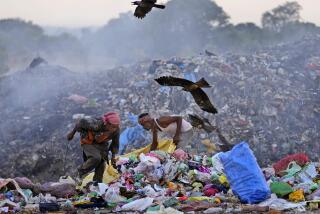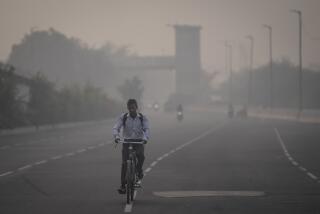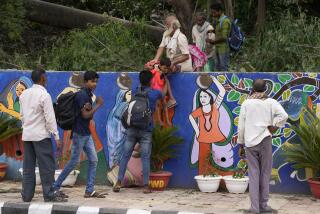New Delhi Park Is Clean for a Day, for Politicians
- Share via
NEW DELHI — The park had been scrubbed to near-spotlessness by the time the politicians arrived, and the nearby alleys were cleared of garbage. Even the suddenly well-swept dirt wasn’t, well, very dirty.
At least for one day.
In a city that often seems to be drowning in trash, an obscure park was the focus of New Delhi’s “Clean City” campaign, a 10-day festival of parades, posters and pledges of cleanliness. For that day, this little corner of New Delhi was immaculate -- tidied up specially for the politicians’ visit. The rest of the city? For the most part, “clean” was not the word that came to mind.
Every day, this city of 13 million people produces anywhere from 7,000 to 12,000 tons of trash. At best, perhaps 6,000 tons of that is disposed of properly. The rest has to go somewhere -- and alleyways, streets, parks and even ancient monuments are common dumping grounds.
It’s not just trash. Human waste is a problem in a city where millions of people have no access to toilets. In the poorest slums, streets serve as open-air toilets, and even in the nicest neighborhoods some street corners, long used as public urinals, can choke passersby with a curtain of urine stench.
Every day, more than 1,000 people move into the city, many fleeing poverty-ravaged villages. And every weekday, 1 million or more people come to work from surrounding towns.
The result is a city where normally genteel people find themselves turning to four-letter descriptives.
“We’re drowning in [feces],” said Sunita Narain, who heads the New Delhi-based Center for Science and Environment, India’s most prominent environmental organization. “Delhi is becoming a modern city, and with a modern city goes a lot of garbage and waste.”
But perhaps the most astonishing thing about New Delhi’s dirtiness is that it’s less than it was. Street cleaners wielding straw brooms are a more familiar sight today than a few years back, and special magistrates now patrol the streets, handing out fines for public urination and littering. There are even a few more toilets.
Most important, government legislation has forced buses and taxis to convert to compressed natural gas -- a change that dramatically lessened the cloud of smog that once enveloped this traffic-clogged city.
Much of the credit, her backers say, goes to Sheila Dikshit, who as New Delhi’s chief minister is the city’s top official and the equivalent of its mayor.
Her latest campaign, the Clean City program, which ended Oct. 2, wasn’t intended to leave the streets spotless, she says. But with hundreds of children marching through neighborhoods carrying posters and chanting slogans, maybe it will change a few attitudes.
“I’m not expecting a miracle, but I’m certainly expecting to get people’s attention,” she said in an interview.
Dikshit, who has served as chief minister for five years, arrived at the park in the Sarita Vihar neighborhood to lead the schoolchildren in the campaign’s six pledges, including, “I won’t throw garbage in the street” and “I will not urinate in the street, in a park, or in the open.”
Such public displays set off alarms with her critics. At best, they say, it’s a quixotic, simplistic campaign against a desperately complicated problem. At worst, they contend, it’s a cynical political display ahead of November elections.
The campaign “only indicates that the Delhi government has taken into cognizance the inefficiency and failure” of the city bureaucracy to keep New Delhi clean, Vijender Kumar, an opposition politician, said recently.
Presumably, politics does play a part in the campaign. But in a culture where garbage cleanup has long been tangled in notions about class and caste -- only very low-caste Indians have traditionally collected waste -- the idea that everyone has a responsibility for the city’s cleanliness is a novel idea.
So were any attitudes changed during the campaign? Around the suddenly clean Sarita Vihar park, few people said they thought so.
“What is this going to accomplish?” asked a neighborhood woman, who wanted to be identified only as Kirin.
“I just wish the politicians would visit more regularly,” she added, “so then it would be cleaned more regularly.”
More to Read
Sign up for Essential California
The most important California stories and recommendations in your inbox every morning.
You may occasionally receive promotional content from the Los Angeles Times.













